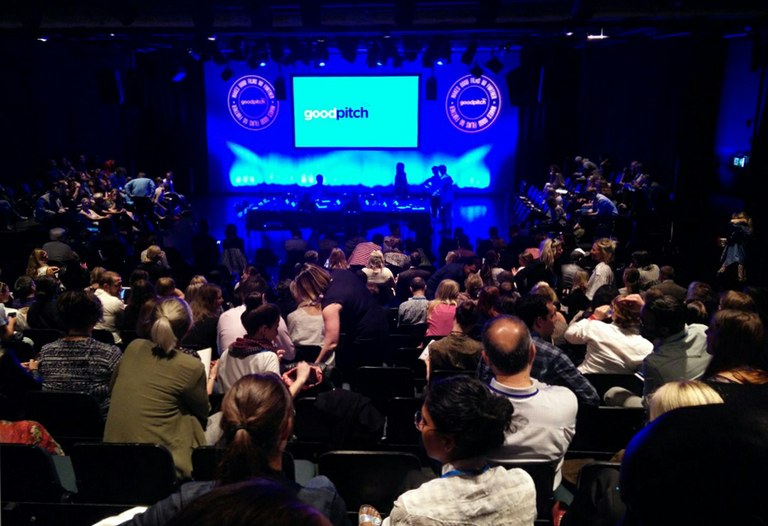EngageMedia Blog
Snowden: Systemic Problems Need Systemic Change
It’s not everyday that we can see an academic and a security expert turned whistleblower talk whilst being completely able to understand and complement each another. This is why the events that unfolded during Rightscon 2016 were interesting.
The academic, Ronald J. Deibert, Professor of Political Science and Director of The Citizen Lab, opened the discussion with several topics that have been much explored before, one of them being the special place and relationship, and more specifically the responsibility, of academia on the issue of public security versus the state. The security expert, Edward Snowden, who is now residing in Moscow, Russia, talked to the hundreds of participants present at the discussion with great enthusiasm, as always. He elaborated upon the meaning of current security threats and the challenges they pose to culture and education.
In Snowden’s opinion, technology can protect freedom but it can also become a threat to humanity. He said that right now, even though a great revelation regarding the need for online security has occurred in Europe, little has been done to help people in China or North Korea, where the public lives in almost total isolation.
Both speakers agreed that we need to develop a multi-perspective approach to strengthen civil society’s defense against intrusion from state and non-state intelligence bodies. Professor Ronald specifically mentioned how the role to develop such an approach can fall upon the people who are active in universities around the globe. They can offer help by conducting research based on their own institutions, in order for the movement to benefit from findings based on data and proven methodology. Furthermore, these kind of activities will not only inspire technicians but also law students and their respective departments.
Ronald stated that funds for doing corporate research are much greater compared to the funds going to universities, and with big money, the corporate world can comparatively do a lot more things. But still there's a need and a challenge for academia to continue their research in campuses he said, pointing out that most of the popular software and internet infrastructure we are using today sprang from campuses throughout the Western hemisphere, largely due to the freedom and space provided by academic culture. He also suggested using fellowship programs to attract new students to study this field.
Ronald believes that this kind of academia-inspired movement can be molded to create a civil society intelligence that can counter state intelligence. The movement's task is to gather data and find evidence that will work against state intelligence and private security companies, especially to help prove how certain state intelligence activities conflict with fundamental human rights.
Related to this, Snowden added that such a movement will need to work alongside journalists, especially now since they have been heavily targeted by the state. On the other side, journalists can become spokespersons of the movement, getting the word out to the public.
Snowden showed a trend of how the state is becoming more and more powerful. Practices like inserting spyware or malware concealed within an update and/or software upgrade becoming more common. Privacy rights are shun everyday all over the world. This, in turn, creates cultural and academic questions about why this is happening, which the younger generation will especially need to be confronted by.
For Snowden, it's hard to explain why the world is seemingly becoming stricter with ever increasing restrictions to freedom. A culture of 24-hour surveillance has become normalized, so be careful. Remember to look over your shoulder.
Seeing Impact in Progress at Good Pitch Europe

On 24 May 2016, Andrew Lowenthal, Director of EngageMedia, and myself, Communications and Outreach Coordinator, attended the 4th installment of Good Pitch Europe in Stockholm, Sweden. The event brought together 7 feature-length films, over 170 organizations and 259 participants.
Good Pitch, which was originally developed by Britdoc and the Sundance Documentary Institute in 2008, aims to amplify the impact of documentary films that address social and environmental issues.

Good Pitch is different to standard pitching forums where filmmakers ask for financial support and look for distribution avenues. It instead seeks to forge partnerships between filmmakers and a wide range of stakeholders, including NGOS, philanthropists, social entrepreneurs, corporate partners, broadcasters, educators and policy-makers, creating coalitions and campaigns around environmental and social issues, which are good for the partners, good for the films and good for society.
This was my first Good Pitch experience, which I’ve heard so much about over recent years through the global Video for Change community and through some of the acclaimed films it has supported, such as Citizen Four, No Fire Zone and The Look of Silence.

As Good Pitch2 is being hosted for the first time in Southeast Asia next year by Indonesian organization In-Docs, and which EngageMedia is an outreach partner of, it was especially useful for me to learn from the organizers and participants, and witness the process first-hand. After groups of production teams had presented their projects, which were mostly 80% completed, foundations, media outlets, organizations and even companies such as Google and Vine pledged financial and distribution support. It would be amazing to see how we could get similar support for critical films from the region.

However, the one-day event itself is just a fraction of what goes into the work for Good Pitch. Leading up to Jakarta in May 2017, five films will be selected to receive mentorship such as impact and pitching workshops, outreach support which includes connecting the films to hundreds of potential allies that can help them reach wider (or more precise) audiences and ultimately aiding them to produce more real and lasting impact. And we’re looking very forward to being a part of making all that happen!
 Subscribe to blog feed
Subscribe to blog feed